(完整版)反义疑问句练习题(附答案)
- 格式:doc
- 大小:121.01 KB
- 文档页数:9
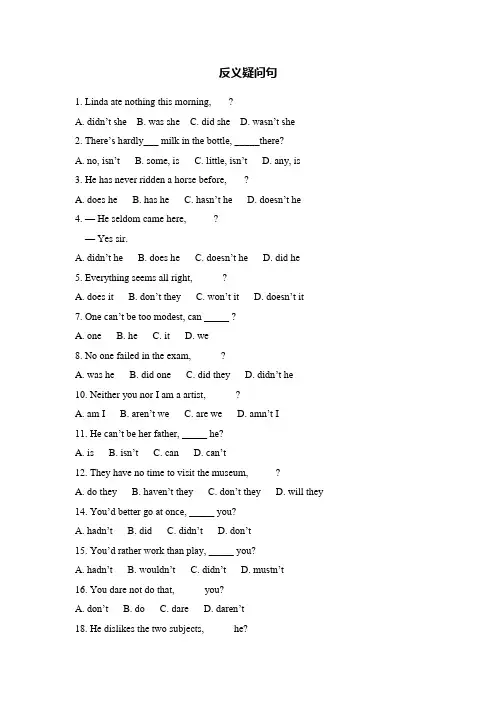
反义疑问句1. Linda ate nothing this morning, ___?A. didn’t sheB. was sheC. did sheD. wasn’t she2. There’s hardly___ milk in the bottle, _____there?A. no, isn’tB. some, isC. little, isn’tD. any, is3. He has never ridden a horse before, ___?A. does heB. has heC. hasn’t heD. doesn’t he4. — He seldom came here, _____?— Yes sir.A. didn’t heB. does heC. doesn’t heD. did he5. Everything seems all right, _____ ?A. does itB. don’t theyC. won’t itD. doesn’t it7. One can’t be too modest, can _____ ?A. oneB. heC. itD. we8. No one failed in the exam, _____ ?A. was heB. did oneC. did theyD. didn’t he10. Neither you nor I am a artist, _____ ?A. am IB. aren’t weC. are weD. amn’t I11. He can’t be her father, _____ he?A. isB. isn’tC. canD. can’t12. They have no time to visit the museum, _____?A. do theyB. haven’t theyC. don’t theyD. will they14. You’d better go at once, _____ you?A. hadn’tB. didC. didn’tD. don’t15. You’d rather work than play, _____ you?A. hadn’tB. wouldn’tC. didn’tD. mustn’t16. You dare not do that, _____ you?A. don’tB. doC. dareD. daren’t18. He dislikes the two subjects, _____ he?A. doesB. d oesn’tC. isD. isn’t19. These tools are useless now, _____ ?A. are theyB. aren’t theyC. is itD. isn’t it20. He used to get up at 6:30, _____ he?A. didn’t heB. did heC. used heD. wouldn’t he22. He ought to win the first prize, _______ he?A. mustn’tB. oughtn’tC. shouldn’tD. Both B and C.23. Let’s go there by bus, ___?A. will youB. shall weC. don’t youD. will you24. Let us go to play football, ___?A. will youB. shall weC. do weD. are we25. Don’t forget to give Polly some food and change her water, ___?A. will youB. shall weC. won’t youD. do you26. —Let’s go shopping this afternoon, _____?— All right.A. will weB. shall weC. don’t weD. are we27. — Pass me the dictionary, _____?— Yes, with pleasure.A. would youB. will youC. won’t youD. wouldn’t you30. There is little water in the glass, ____?A. isn’t thereB. isn’t itC. is itD. is there32. There won’t be any concert this Saturday even ing, _____ ?A. will there notB. will thereC. is thereD. won’t33. — I guess she taught herself Japanese, ______?— Yes.A. don’t IB. did sheC. do ID. didn’t she34. I don’t believe you are right, _____ ?A. are youB. do youC. won’t youD. do35. She doesn’t think that Tom sings best in the class, _____ ?A. does sheB. doesn’t sheC. does heD. doesn’t he37. I know you didn’t want to hurt me, _____ ?A. did youB. didn’t youC. do ID. don’t I38. If my father were here he would be very happy, _____ ?A. weren’t heB. were heC. wouldn’t heD. would heKey: 1—5 CDBDD 6—10 BACDC 11—15 AABAB 16—20 CCBBA 21—25CDBAA 26—30 BBBAD 31—35 BBDAA 36—38 AAC。
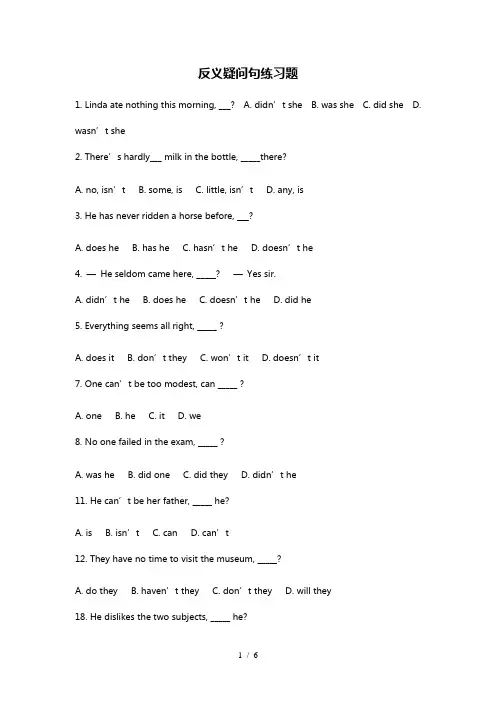
反义疑问句练习题1. Linda ate nothing this morning, ___? A. didn’t she B. was she C. did she D. wasn’t she2. There’s hardly___ milk in the bottle, _____there?A. no, isn’tB. some, isC. little, isn’tD. any, is3. He has never ridden a horse before, ___?A. does heB. has heC. hasn’t heD. doesn’t he4. —He seldom came here, _____? —Yes sir.A. didn’t heB. does heC. doesn’t heD. did he5. Everything seems all right, _____ ?A. does itB. don’t theyC. won’t itD. doesn’t it7. One can’t be too modest, can _____ ?A. oneB. heC. itD. we8. No one failed in the exam, _____ ?A. was heB. did oneC. did theyD. didn’t he11. He can’t be her father, _____ he?A. isB. isn’tC. canD. can’t12. They have no time to visit the museum, _____?A. do theyB. haven’t theyC. don’t theyD. will they18. He dislikes the two subjects, _____ he?A. doesB. doesn’tC. isD. isn’t19. These tools are useless now, _____ ?A. are theyB. aren’t theyC. is itD. isn’t it23. Let’s go there by bus, ___?A. will youB. shall weC. don’t youD. will you24. Let us go to play football, ___?A. will youB. shall weC. do weD. are we25. Don’t forget to give Polly some food and change her water, ___?A. will youB. shall weC. won’t youD. do you26. —Let’s go shopping this afternoon, _____? —All right.A. will weB. shall weC. don’t weD. are we27. —Pass me the dictionary, _____? —Yes, with pleasure.A. would youB. will youC. won’t youD. wouldn’t you30. There is little water in the glass, ____?A. isn’t thereB. isn’t itC. is itD. is there32. There won’t be any concert this Saturday evening, _____ ?A. will there notB. will thereC. is thereD. won’t33. —I guess she taught herself Japanese, ______? —Yes.A. don’t IB. did sheC. do ID. didn’t she34. I don’t believe you are right, _____ ?A. are youB. do youC. won’t youD. do35. She doesn’t think that Tom sings best in the class, _____ ?A. does sheB. doesn’t sheC. does heD. doesn’t he37. I know you didn’t want to hurt me, _____ ?A. did youB. didn’t youC. do ID. don’t I38. If my father were here he would be very happy, _____ ?A. weren’t heB. were heC. wouldn’t heD. would he1.It’s very hot today, _______________ ?2. He can speak Chinese, _______________ ?3. Meimei studies in a middle school, _______________ ?4. He never gets up late , _______________ ?5. Don’t go out at night, _______________ ?6.He never loves cold weather , _______________ ?7. You finished the task yesterday, _______________ ?9.T om has been to Singapore , _______________ ?10.The story is little interesting, _______________ ?11.Everything starts to grow in spring, _______________ ?12.He can hardly finish his homework, _______________ ?13.I’m in Class 3,Grade 2, _______________ ?14.Let’s go shopping , _______________ ?15.She doesn’t like climbing hills , _______________ ?16.I don’t think it is cold today, _______________ ?17. You think he is a good flight attendant, _______________ ?18.Nobody knows where she lives, _______________ ?19.Few students can answer the question, _______________ ?20.Mike likes English, _______________ ?21.That was a wonderful night, _______________ ?22.Your sister helped him, _______________ ?23.T om is skating, _______________ ?24.You aren’t a teacher, _______________ ?25.They haven’t been to the Great Wall, _______________ ?26.You will join the soccer team, _______________ ?27.He likes neither apples nor pears, _______________ ?28.There are some good books for you, _______________ ?29.They have been there twice, _______________ ?30.Let’s do it now, _______________ ?31.You dislike this kind of gifts, _______________ ?32.Nothing is impossible, _______________ ?33.Everything is possible, _______________ ?34.He doesn’t go to school by bus, _______________ ?35.There is little milk left in the bottle, _______________ ?36.Let us clean the classroom by ourselves, _______________ ?37.He has studied here for about four years, _______________ ?38.You have never lost money before, _______________ ?39.Few of them hurt themselves in the accident last night, _______________ ?40.Peter could hardly see the words on the blackboard, _______________ ?41.She’s American, _______________ ?42.There will be a volleyball match in our school, _______________ ?43.Don’t smoke in the reading-room, _______________ ?44.I don’t think he is right, _______________ ?45.You must do your homework by yourself, _______________ ?46.You mustn’t touch the machine, _______________ ?47.He must be a worker, _______________ ?48.Someone looked for me yesterday, _______________ ?49.I’m a teacher, _______________ ?50.What a nice watch, _______________ ?51.I wish to use your ruler, _______________ ?52.I have to stay at home, _______________ ?53.You’d better wear warm clothes today, _______________ ?54.What he needs is his parents’love, _______________ ?55.You’d like a cup of tea, _______________ ?56.Don’t be late again, _______________ ?57.Their prices are really low, _______________ ?58.Reading is good for you to learn English, _______________ ?59.No one knows about it, _______________ ?60.I think you should study hard, _______________ ?Key: 1—5 CDBDD 6—10 BACDC 11—15 AABAB 16—20 CCBBA 21—25CDBAA 26—30 BBBAD 31—35 BBDAA 36—38 AAC附加答案:1 . isn’t it 2. can’t he 3.doesn’t she 4.does he 5.will you6. does he7.didn’t you8. isn’t9.hasn’t he 10.is it 11.doesn’t it 12.can he 13 .aren’t I 14.shall we 15.does she 16.is it 17.don’t you 18does it 19. can they 20.doesn’t he 21.wasn’t it 22.didn’t she 23.isn’t he 24.are you 25.have they 26.wont you 27.does he 28.aren’t there 29.haven’t they 30.shall we 31.don’t you 32.is it 33.isn’t it 34.does he 35.is there 36.will you 37.hasn’t he 38.have you 39.did they 40.could he 41.isn’t she 42.won’t there 43.will you 44.is he 45.mustn’t you 46.must you 47.isn’t he 48.didn’t they 49.aren’t I 50.isn’t it51.may I 52.don’t I 53.hadn’t you 54.isn’t it 55.wouldn’t you 56.will you 57.aren’t they 58.isn’t it 59.do they 60.shouldn’t you。
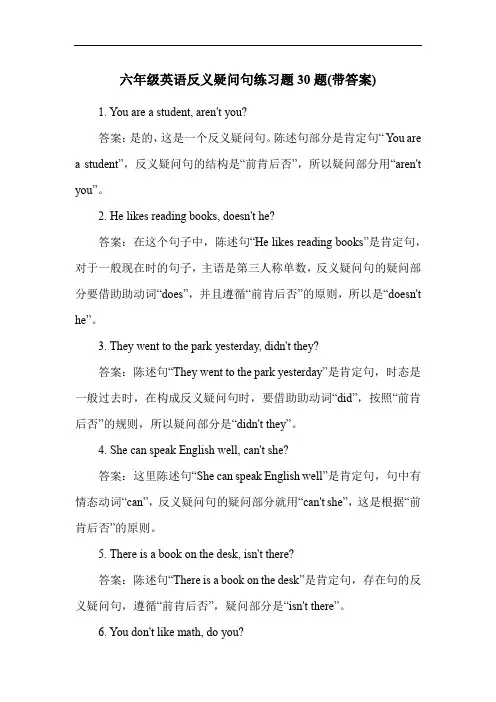
六年级英语反义疑问句练习题30题(带答案)1. You are a student, aren't you?答案:是的,这是一个反义疑问句。
陈述句部分是肯定句“ You are a student”,反义疑问句的结构是“前肯后否”,所以疑问部分用“aren't you”。
2. He likes reading books, doesn't he?答案:在这个句子中,陈述句“He likes reading books”是肯定句,对于一般现在时的句子,主语是第三人称单数,反义疑问句的疑问部分要借助助动词“does”,并且遵循“前肯后否”的原则,所以是“doesn't he”。
3. They went to the park yesterday, didn't they?答案:陈述句“They went to the park yesterday”是肯定句,时态是一般过去时,在构成反义疑问句时,要借助助动词“did”,按照“前肯后否”的规则,所以疑问部分是“didn't they”。
4. She can speak English well, can't she?答案:这里陈述句“She can speak English well”是肯定句,句中有情态动词“can”,反义疑问句的疑问部分就用“can't she”,这是根据“前肯后否”的原则。
5. There is a book on the desk, isn't there?答案:陈述句“There is a book on the desk”是肯定句,存在句的反义疑问句,遵循“前肯后否”,疑问部分是“isn't there”。
6. You don't like math, do you?答案:陈述句“You don't like math”是否定句,反义疑问句的结构是“前否后肯”,所以疑问部分是“do you”。
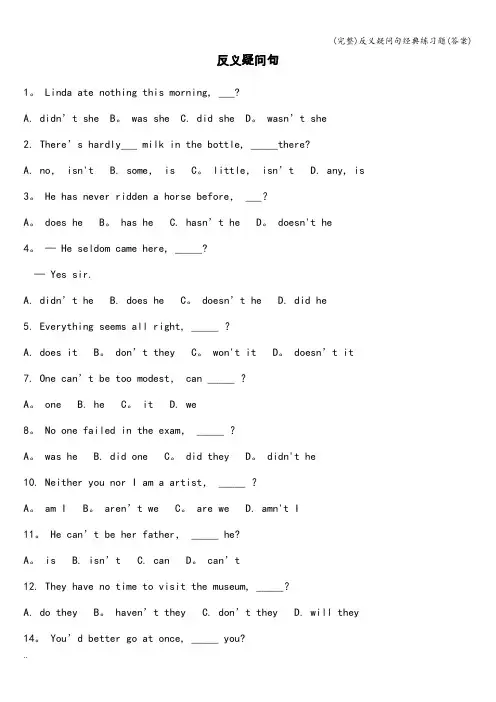
反义疑问句1。
Linda ate nothing this morning, ___?A. didn’t she B。
was she C. did she D。
wasn’t she2. There’s hardly___ milk in the bottle, _____there?A. no, isn'tB. some, is C。
little,isn’t D. any, is 3。
He has never ridden a horse before, ___?A。
does he B。
has he C. hasn’t he D。
doesn't he 4。
— He seldom came here, _____?— Yes sir.A. didn’t heB. does he C。
doesn’t he D. did he5. Everything seems all right, _____ ?A. does it B。
don’t they C。
won't it D。
doesn’t it7. One can’t be too modest, can _____ ?A。
one B. he C。
it D. we8。
No one failed in the exam, _____ ?A。
was he B. did one C。
did they D。
didn't he10. Neither you nor I am a artist, _____ ?A。
am I B。
aren’t we C。
are we D. amn't I11。
He can’t be her father, _____ he?A。
is B. isn’t C. can D。
can’t12. They have no time to visit the museum, _____?A. do they B。
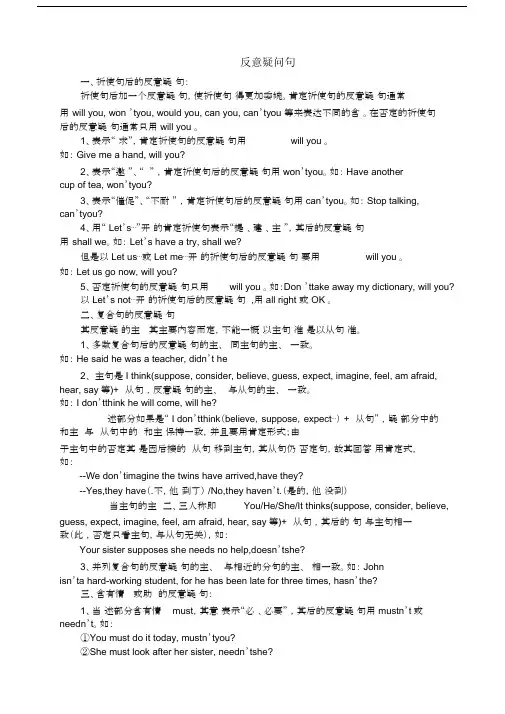
反意疑问句一、祈使句后的反意疑句:祈使句后加一个反意疑句,使祈使句得更加委婉。
肯定祈使句的反意疑句通常用will you, won ’tyou, would you, can you, can’tyou 等来表达不同的含。
在否定的祈使句后的反意疑句通常只用 will you 。
1、表示“ 求”,肯定祈使句的反意疑句用will you 。
如: Give me a hand, will you?2、表示“邀”、“ ” ,肯定祈使句后的反意疑句用 won’tyou。
如: Have anothercup of tea, won’tyou?3、表示“催促”、“不耐” ,肯定祈使句后的反意疑句用 can’tyou。
如: Stop talking,can’tyou?4、用“ Let’s⋯”开的肯定祈使句表示“提、建、主”,其后的反意疑句用shall we。
如: Let’s have a try, shall we?但是以 Let us⋯或 Let me⋯开的祈使句后的反意疑句要用will you 。
如: Let us go now, will you?5、否定祈使句的反意疑句只用will you 。
如:Don ’ttake away my dictionary, will you?以Let’s not⋯开的祈使句后的反意疑句 ,用 all right 或 OK 。
二、复合句的反意疑句其反意疑的主其主要内容而定,不能一概以主句准是以从句准。
1、多数复合句后的反意疑句的主、同主句的主、一致。
如: He said he was a teacher, didn’t he2、主句是 I think(suppose, consider, believe, guess, expect, imagine, feel, am afraid, hear, say等)+从句,反意疑句的主、与从句的主、一致。
如: I don’tthink he will come, will he?述部分如果是“ I don’tthink(believe,suppose,expect⋯) +从句” ,疑部分中的和主与从句中的和主保持一致,并且要用肯定形式;由于主句中的否定其是因后接的从句移到主句,其从句仍否定句,故其回答用肯定式,如:--We don’timagine the twins have arrived,have they?--Yes,they have(.不,他到了) /No,they haven’t.(是的,他没到)当主句的主二、三人称即You/He/She/It thinks(suppose, consider, believe, guess, expect, imagine, feel, am afraid, hear, say等)+从句,其后的句与主句相一致(此,否定只看主句,与从句无关),如:Your sister supposes she needs no help,doesn’tshe?3、并列复合句的反意疑句的主、与相近的分句的主、相一致。
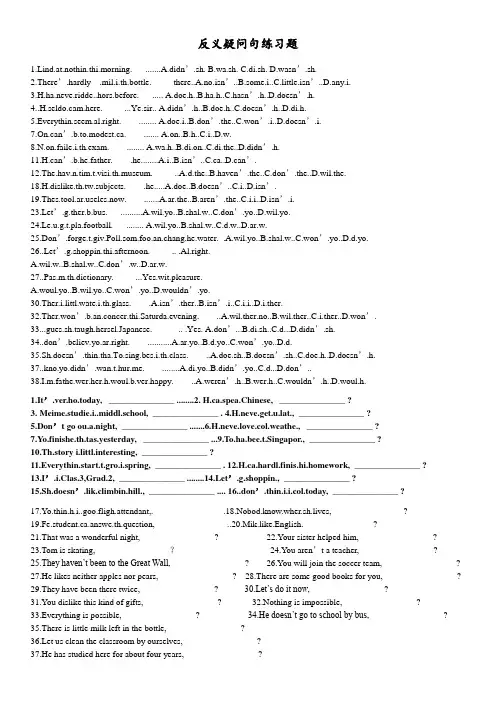
反义疑问句练习题1.Lind.at.nothin.thi.morning.___.......A.didn’.sh. B.wa.sh. C.di.sh. D.wasn’.sh.2.There’.hardly__.mil.i.th.bottle._____there..A.no.isn’..B.some.i..C.little.isn’..D.any.i.3.H.ha.neve.ridde..hors.before.___..... A.doe.h..B.ha.h..C.hasn’.h..D.doesn’.h.4..H.seldo.cam.here._____...Ye.sir.. A.didn’.h..B.doe.h..C.doesn’.h..D.di.h.5.Everythin.seem.al.right.____........ A.doe.i..B.don’.the..C.won’.i..D.doesn’.i.7.On.can’.b.to.modest.ca.____....... A.on..B.h..C.i..D.w.8.N.on.faile.i.th.exam.____........ A.wa.h..B.di.on..C.di.the..D.didn’.h.11.H.can’.b.he.father.____.he........A.i..B.isn’..C.ca..D.can’.12.The.hav.n.tim.t.visi.th.museum._____..A.d.the..B.haven’.the..C.don’.the..D.wil.the.18.H.dislike.th.tw.subjects.____.he.....A.doe..B.doesn’..C.i..D.isn’.eles.now.____.......A.ar.the..B.aren’.the..C.i.i..D.isn’.i.23.Let’.g.ther.b.bus.___..........A.wil.yo..B.shal.w..C.don’.yo..D.wil.yo.24.Le.u.g.t.pla.football.___........ A.wil.yo..B.shal.w..C.d.w..D.ar.w.25.Don’.forge.t.giv.Poll.som.foo.an.chang.he.water._.A.wil.yo..B.shal.w..C.won’.yo..D.d.yo.26..Let’.g.shoppin.thi.afternoon._____.. .Al.right.A.wil.w..B.shal.w..C.don’.w..D.ar.w.27..Pas.m.th.dictionary._____...Yes.wit.pleasure.A.woul.yo..B.wil.yo..C.won’.yo..D.wouldn’.yo.30.Ther.i.littl.wate.i.th.glass.____.A.isn’.ther..B.isn’.i..C.i.i..D.i.ther.32.Ther.won’.b.an.concer.thi.Saturda.evening.____..A.wil.ther.no..B.wil.ther..C.i.ther..D.won’.33...gues.sh.taugh.hersel.Japanese.______.. .Yes. A.don’...B.di.sh..C.d...D.didn’.sh.34..don’.believ.yo.ar.right.____...........A.ar.yo..B.d.yo..C.won’.yo..D.d.35.Sh.doesn’.thin.tha.To.sing.bes.i.th.class.____..A.doe.sh..B.doesn’.sh..C.doe.h..D.doesn’.h.37..kno.yo.didn’.wan.t.hur.me.____........A.di.yo..B.didn’.yo..C.d...D.don’..38.I.m.fathe.wer.her.h.woul.b.ver.happy.____..A.weren’.h..B.wer.h..C.wouldn’.h..D.woul.h.1.It’.ver.ho.today, _______________ ........2. H.ca.spea.Chinese, _______________ ?3. Meime.studie.i..middl.school, _______________ .t., _______________ ?5.Don’t go ou.a.night, _______________ .......6.H.neve.love.col.weathe., _______________ ?7.Yo.finishe.th.tas.yesterday, _______________ ...9.To.ha.bee.t.Singapor., _______________ ?10.Th.story i.littl.interesting, _______________ ?11.Everythin.start.t.gro.i.spring, _______________ . 12.H.ca.hardl.finis.hi.homework, _______________ ?13.I’.i.Clas.3,Grad.2, _______________ ........14.Let’.g.shoppin., _______________ ?15.Sh.doesn’.lik.climbin.hill., _______________ .... 16..don’.thin.i.i.col.today, _______________ ?17.Yo.thin.h.i..goo.fligh.attendant,. _______________ .18.Nobod.know.wher.sh.lives, _______________ ?19.Fe.student.ca.answe.th.question, _______________ ..20.Mik.like.English. _______________ ?21.That was a wonderful night, _______________ ? 22.Your sister helped him, _______________ ?23.Tom is skating, _______________ ?24.You aren’t a teacher, _______________ ?25.They haven’t been to the Great Wall, _______________ ? 26.You will join the soccer team, _______________ ?27.He likes neither apples nor pears, _______________ ? 28.There are some good books for you, _______________ ?29.They have been there twice, _______________ ? 30.Let’s do it now, _______________ ?31.You dislike this kind of gifts, _______________ ? 32.Nothing is impossible, _______________ ?33.Everything is possible, _______________ ? 34.He doesn’t go to school by bus, _______________ ?35.There is little milk left in the bottle, _______________ ?36.Let us clean the classroom by ourselves, _______________ ?37.He has studied here for about four years, _______________ ?38.You have never lost money before, _______________ ?39.Few of them hurt themselves in the accident last night, _______________ ?40.Peter could hardly see the words on the blackboard, _______________ ?41.She’s American, _______________ ? 42.There will be a volleyball match in our school, _______________ ? 43.Don’t smoke in the reading-room, _______________ ? 44.I don’t think he is right, _______________ ?45.You must do your homework by yourself, _______________ ?46.You mustn’t touch the machine, _______________ ?47.He must be a worker, _______________ ? 48.Someone looked for me yesterday, _______________ ?49.I’m a teacher, _______________ ? 50.What a nice watch, _______________ ?51.I wish to use your ruler, _______________ ? 52.I have to stay at home, _______________ ?53.You’d better wear warm clothes today, _______________ ?54.What he needs is his parents’ love, _______________ ?55.You’d like a cup of tea, _______________ ? 56.Don’t be late again, _______________ ?57.Their prices are really low, _______________ ? 58.Reading is good for you to learn English, _______________ ? 59.No one knows about it, _______________ ? 60.I think you should study hard, _______________ ?Key: 1—5 CDBDD 6—10 BACDC 11—15 AABAB 16—20 CCBBA 21—25CDBAA 26—30 BBBAD 31—35 BBDAA 36—38 AAC附加答案:..isn’.it.. 2.can’.h.. 3.doesn’.she..4.doe.he... 5.wil.yo.6.does.he.7.didn’.you .8..isn’....9.hasn’.he...10.i.it11.doesn’t it 12.can he 13 .aren’t I 14.shall we 15.does she16.is it 17.don’t you18does it 19. can they 20.doesn’t he21.wasn’t it 22.didn’t she 23.isn’t he 24.are you 25.have they26.wont you 27.does he 28.aren’t there 29.haven’t they 30.shall we31.don’t you 32.is it 33.isn’t it 34.does he 35.is th ere36.will you 37.hasn’t he 38.have you 39.did they 40.could he41.isn’t she 42.won’t there 43.will you 44.is he 45.mustn’t you46.must you 47.isn’t he 48.didn’t they 49.aren’t I 50.isn’t it51.may I 52.don’t I 53.hadn’t you 54.isn’t it 55.wouldn’t you56.will you 57.aren’t they 58.isn’t it 59.do they 60.shouldn’t you。
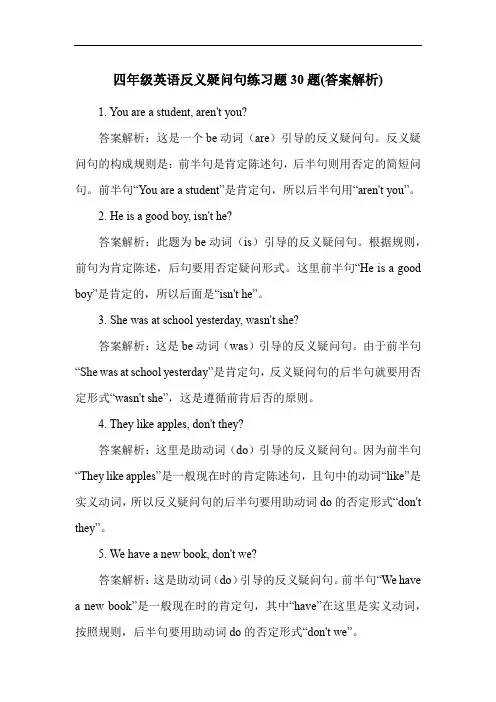
四年级英语反义疑问句练习题30题(答案解析)1. You are a student, aren't you?答案解析:这是一个be动词(are)引导的反义疑问句。
反义疑问句的构成规则是:前半句是肯定陈述句,后半句则用否定的简短问句。
前半句“You are a student”是肯定句,所以后半句用“aren't you”。
2. He is a good boy, isn't he?答案解析:此题为be动词(is)引导的反义疑问句。
根据规则,前句为肯定陈述,后句要用否定疑问形式。
这里前半句“He is a good boy”是肯定的,所以后面是“isn't he”。
3. She was at school yesterday, wasn't she?答案解析:这是be动词((was)引导的反义疑问句。
由于前半句“She was at school yesterday”是肯定句,反义疑问句的后半句就要用否定形式“wasn't she”,这是遵循前肯后否的原则。
4. They like apples, don't they?答案解析:这里是助动词((do)引导的反义疑问句。
因为前半句“They like apples”是一般现在时的肯定陈述句,且句中的动词“like”是实义动词,所以反义疑问句的后半句要用助动词do的否定形式“don't they”。
5. We have a new book, don't we?答案解析:这是助动词((do)引导的反义疑问句。
前半句“We have a new book”是一般现在时的肯定句,其中“have”在这里是实义动词,按照规则,后半句要用助动词do的否定形式“don't we”。
6. Tom can swim, can't he?答案解析:这是情态动词((can)引导的反义疑问句。
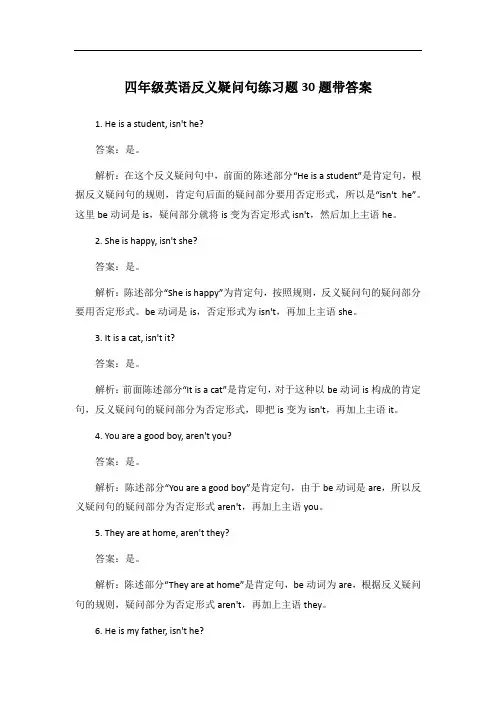
四年级英语反义疑问句练习题30题带答案1. He is a student, isn't he?答案:是。
解析:在这个反义疑问句中,前面的陈述部分“He is a student”是肯定句,根据反义疑问句的规则,肯定句后面的疑问部分要用否定形式,所以是“isn't he”。
这里be动词是is,疑问部分就将is变为否定形式isn't,然后加上主语he。
2. She is happy, isn't she?答案:是。
解析:陈述部分“She is happy”为肯定句,按照规则,反义疑问句的疑问部分要用否定形式。
be动词是is,否定形式为isn't,再加上主语she。
3. It is a cat, isn't it?答案:是。
解析:前面陈述部分“It is a cat”是肯定句,对于这种以be动词is构成的肯定句,反义疑问句的疑问部分为否定形式,即把is变为isn't,再加上主语it。
4. You are a good boy, aren't you?答案:是。
解析:陈述部分“You are a good boy”是肯定句,由于be动词是are,所以反义疑问句的疑问部分为否定形式aren't,再加上主语you。
5. They are at home, aren't they?答案:是。
解析:陈述部分“They are at home”是肯定句,be动词为are,根据反义疑问句的规则,疑问部分为否定形式aren't,再加上主语they。
6. He is my father, isn't he?答案:是。
解析:陈述部分“He is my father”为肯定句,be动词是is,反义疑问句的疑问部分为否定形式isn't,再加上主语he。
7. She is in the classroom, isn't she?答案:是。
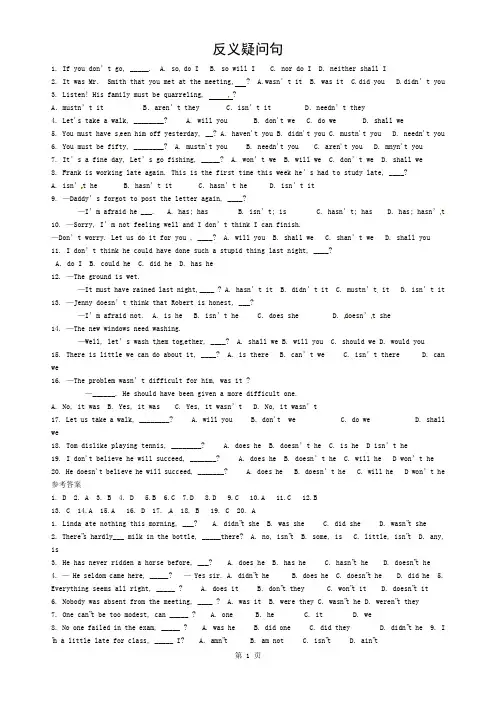
反义疑问句1. If you don’t go, _____. A. so do I B. so will I C. nor do I D. neither shall I2. It was Mr. Smith that you met at the meeting, ? A.wasn’t it B. was it C.did you D.didn’t you3. Listen! His family must be quarreling, ?A.mustn’t it B.aren’t they C.isn’t it D.needn’t they4. Let's take a walk, ________? A. will you B. don't we C. do we D. shall we5. You must have s een him off yesterday, __? A. haven't you B. didn't you C. mustn't you D. needn't you6. You must be fifty, ________? A. mustn't you B. needn't you C. aren't you D. mnyn't you7. It’s a fine day, Let’s go fishing, _____? A. won’t we B. will we C. don’t we D. shall we8. Frank is working late again. This is the first time this week he’s had t o study late, ____?A. isn’t heB. hasn’t itC. hasn’t heD. isn’t it9. —Daddy’s forgot to post the letter again, ____?—I’m afraid he ___. A. has; has B. isn’t; is C. hasn’t; has D. has; hasn’t 10. —Sorry, I’m not feeling well and I don’t think I can finish.—Don’t worry. Let us do it for you , ____? A. will you B. shall we C. shan’t we D. shall you11. I don’t think he could have done such a stupid thing last night, ____?A. do IB. could heC. did heD. has he12. —The ground is wet.—It must have rained last night,____ ? A. hasn’t it B. didn’t it C. mustn’t it D. isn’t it 13. —Jenny doesn’t think that Robert is honest, ___?—I’m afraid not. A. is he B. isn’t he C. does she D. doesn’t she14. —The new windows need washing.—Well, let’s wash t hem tog ether, ____? A. shall we B. will you C. should we D. would you15. There is little we can do about it, ____? A. is there B. can’t we C. isn’t there D. can we16. —The problem wasn’t difficult for him, was it ?—______. He should have been given a more difficult one.A. No, it wasB. Yes, it wasC. Yes, it wasn’tD. No, it wasn’t17. Let us take a walk, ________? A. will you B. don't we C. do we D. shall we18. Tom dislike playing tennis, ________? A. does he B. doesn’t he C. is he D isn’t he19. I don't believe he will succeed, _______? A. does he B. doesn’t he C. will he D won’t he20. He doesn't believe he will succeed, _______? A. does he B. doesn’t he C. will he D won’t he 参考答案1. D2. A3. B4. D5.B6.C7.D8.D9.C 10.A 11.C 12.B13. C 14.A 15.A 16. D 17. A 18. B 19. C 20. A1. Linda ate nothing this morning, ___? A. didn‟t she B. was she C. did she D. wasn‟t she2. There‟s hardly___ milk in the bottle, _____there? A. no, isn‟t B. some, is C. little, isn‟t D. any, is3. He has never ridden a horse before, ___? A. does he B. has he C. hasn‟t he D. doesn‟t he4. — He seldom came here, _____? — Yes sir. A. didn‟t he B. does he C. doesn‟t he D. did he5. Everything seems all right, _____ ? A. does it B. don‟t they C. won‟t it D. doesn‟t it6. Nobody was absent from the meeting, ____ ? A. was it B. were they C. wasn‟t he D. weren‟t they7. One can‟t be too modest, can _____ ? A. one B. he C. it D. we8. No one failed in the exam, _____ ? A. was he B. did one C. did they D. didn‟t he 9. I ‟m a little late for class, _____ I? A. amn‟t B. am not C. isn‟t D. ain‟t10. Neither you nor I am a artist, _____ ? A. am I B. aren‟t we C. are we D. ain‟t I11. He can‟t be her father, _____ he? A. is B. isn‟t C. can D. can‟t12. They have no time to visit the museum, __ ? A. do they B. haven‟t they C. don‟t they D. will they13. You have John do the work, _____? A. do you B. don‟t you C. haven‟t you D. have you14. You‟d better go at once, _____ you? A. hadn‟t B. did C. didn‟t D. don‟t 15. You ‟d rather work than play, _____ you? A. hadn‟t B. wouldn‟t C. didn‟t D. mustn‟t16. You dare not do that, _____ you? A. don‟t B. do C. dare D. daren‟t17. You must be tired, _____ you? A. mustn‟t B. needn‟t C. aren‟t D. can‟t18. He dislikes the two subjects, _____ he? A. does B. doesn‟t C. is D. isn‟t19. These tools are useless now, _____ ? A. are they B. aren‟t they C. is it D. isn‟t it20. He used to get up at 6:30, _____ he? A. didn‟t he B. did he C. used he D. wouldn‟t he21. I wish to go home early, _____ I? A. can B. must C. may D. do22. He ought to win the first prize, _______ he? A. mustn‟t B. oughtn‟t C. shouldn‟t D. Both B and C.23. Let‟s go there by bus, ___? A. will you B. shall we C. don‟t you D. will you24. Let us go to play football, ___? A. will you B. shall we C. do we D. are we25. Don‟t forget to give Polly some food and change her water,__?A. will youB.shall weC. won‟t youD. do you26. — Let‟s go shopping this afternoon, __? — All right. A. will we B. shall we C. don‟t we D. are we27. — Pass me the dictionary, ___ you? — Yes, with pleasure. A. would B. will C. won‟t D. wouldn‟t 28. — What beautiful weather, _____ ? — Yes, it is. A. is it B. isn‟t it C. am I right D. do you agree29. What kind people, _____ they? A. aren‟t B. are C. won‟t D. will30. There is little water in the glass, ____? A. isn‟t there B. isn‟t it C. is it D. is there31. — They don‟t seem to answer the phone. — There isn‟t anybody at home, _____?A. isn‟t thereB. is thereC. isn‟t itD. is it32. There won‟t be any concert this Saturday evening, ___ ?A. will there notB. will thereC. is thereD. won‟t33. — I guess she taught herself Japanese, ______? — Yes. A. don‟t I B. did she C. do I D. didn‟t she34. I don‟t believe you are right, _____ ? A. are you B. do you C. won‟t you D. do35. She doesn‟t think that Tom sings best in the class, __? A. does she B. doesn‟t she C. does he D. doesn‟t he 36. I told you that everybody couldn‟t do it well, _____ ? A. didn‟t I B. could they C. could he D. did I37. I know you didn‟t want to hurt me, _____ ? A. did you B. didn‟t you C. do I D. don‟t I38. If my father were here he would be very happy, __ ? A. weren‟t he B. were he C. wouldn‟t he D. would he 1—5 CDBDD 6—10 BACDC 11—15 AABAB 16—20 CCBBA 21—25CDBAA 26—30 BBBAD 31—35 BBDAA 36—38 AAC1. You’d rather watch TV this evening, ______?a. isn’t it b. hadn’t you c. wouldn’t you d. won’t you2. I suppose you’re not going today, ______? a. are you b. do you c. don’t you d. aren’t you3. I wish to shake hands with you, ______? a. shall b. may I c. do I d. will I4. Three hours ought to be enough time, ______?a. oughtn’t three hoursb. didn’t theyc. shouldn’t itd. shouldn’t three hours5. They have to study a lot, ______? a. don’t they b. haven’t they c. did they d. hadn’t they6. When the car crashed, your brother escaped being hurt, ______ ?a. didn’t heb. did hec. did itd. didn’t it7. I'm sure dirty, ______? a. am I b. isn’t I c. aren’t I d. am not I8. You seem to be dissatisfied with your present post. I don’t think you judged your ability objecti vely when you applied for it, ______ you? a. do b. did c. don’t d. didn’t9. That’s the sort of the book you want, ______? a. is it d. isn’t that c. is that d. isn’tit10. All these dictionaries are a great help to you, ______?a. are theyb. aren’t theyc. are all these dictionariesd. aren’t all these dictionaries11. The movie that we saw last week was quite interesting, ______?a. wasn’t itb. was itc. didn’t wed. weren’t we12. Tom has been writing letters all afternoon, but he should have finished them by now,______? a. hasn’t he b. has he c. shouldn’t he d. didn’t you13. David told me that you would take a trip to America, ______?a. would youb. woul dn’t youc. did youd. didn’t you14. There appeared to be no better way, ___? a. was there b. were therec. did thered. didn’t there15. You has some trouble finding where I live, ____? a. didn’t you b. hadn’t you c. doI d. don’t I16. He has his hair cut every month, ______? a. has he b. hasn’t he c. does he d. doesn’t he17. Your friend needs to come earlier, __? a. does he b. doesn’t he c. need he d. needn’t he18. The little boy dare not go to church, ___? a. dare he b. daren’t he c. does he d. doesn’t he19. Susan’d have worked abroad if she’d had the chance, ______?a. has sheb. hadn’t shec. would shed. wouldn’t she20. Everyone’s having a good time, ______? a. is he b. isn’t everyone c. does he d. aren’t they21. Any one can join the club, ______? a. can any one b. can’t any one c. can’t they d. can they22. Tell me how to operate the electronic computer, ___? a. will you b. shan’t you c. do you d. don’t you23. Magaret scarcely comes to visit you on Christmas Day, ______?a. doesn’t sheb. does shec. do youd. don’t you24. Let’s listen to the radio program that the teacher mentioned, ______?a. do web. don’t wec. shall wed. shan’t we25. You think you’re funny, ______? a. didn’t you b. are you c. don’t you d. do you26. Janet used to take part in labor in that village, ___? a. used she b. did she c. didn’t she d. should she27. What beautif ul weather, ______? a. is it b. isn’t it c. won’t it d. doesn’t it28. He ought to go to Kwangchow by plane, ______? a. should he b. shouldn’t he c. would he d. wouldn’t he29. We never dared to ask him a question, ______? a. did we b. didn’t we c. dared we d. daren’t we30. Nobody will believe how difficult his work has been ______?a. will heb. won’t nobodyc. will theyd. won’t they31. You must have made the mistake, __? a. mustn’t you b. haven’t you c. didn’t you d. hadn’t you32. Learning how to repair computers takes a long time, ______?a. isn’t itb. aren’t theyc. doesn’t itd. don’t they33. Jack has coffee with breakfast, ___? a. hasn’t Jack b. hasn’t he c. doesn’t Jack d. doesn’t he34. They must have stayed at hotel last night, ____?a. mustn’t theyb. haven’t theyc. didn’t theyd. hadn’t they35. There isn’t anything wrong with the radio, ______? a. is there b. is it c. does it d. does there36. You must be hungry, ______? a. must you b. mustn’t you c. are you d. aren’t you37. Let’s do the exercises by ourselves, ______? a. shall we b. shan’t we c. will you d. will we38. Her daughter had the carpets and curtains cleaned, ______?a. had sh eb. hadn’t shec. didn’t shed. didn’t her daughter39. The teacher had a talk with you, ______? a. has you b. hadn’t she c. did she d. didn’t she40. Something’ll have to be done about the air pollution, ______?a. won’t itb. will itc. has itd. does it1 C 19 D 37 A2 A 20 D 38 C3 B 21 C 39 D4 C 22 A 40 A5 A 23 B 41 6A 24 C 42 7 C 25 D 43 8B 26C 44 9D 27 B 45。
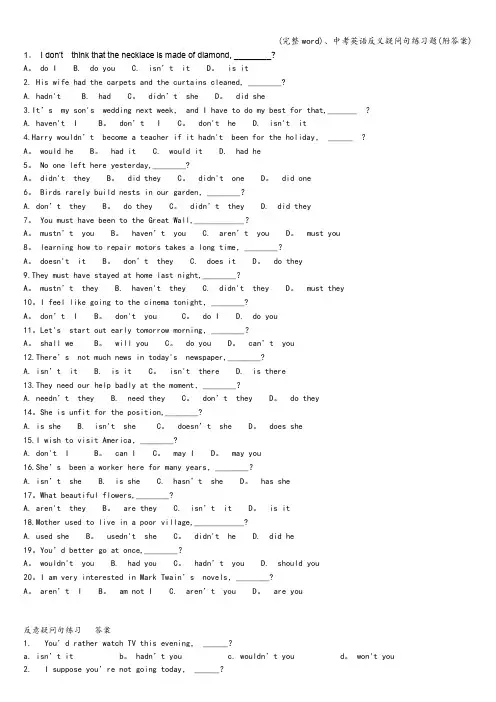
1。
I don’t think that the necklace is made of diamond, ________?A。
do I B. do you C. isn’t it D。
is it2. His wife had the carpets and the curtains cleaned, ________?A. hadn'tB. had C。
didn’t she D。
did she3.It’s m y son's wedding next week, and I have to do my best for that,_______ ?A. haven't I B。
don’t I C。
don't he D. isn't it4.Harry wouldn’t become a teacher if it hadn't been for the holiday, ______ ?A。
would he B。
had it C. would it D. had he5。
No one left here yesterday,________?A。
didn't they B。
did they C。
didn't one D。
did one6。
Birds rarely build nests in our garden,________?A. don’t they B。
do they C。
didn’t they D. did th ey7。
You must have been to the Great Wall,____________?A。
mustn’t you B。
haven’t you C. aren’t you D。
must you8。
learning how to repair motors takes a long time,________?A。
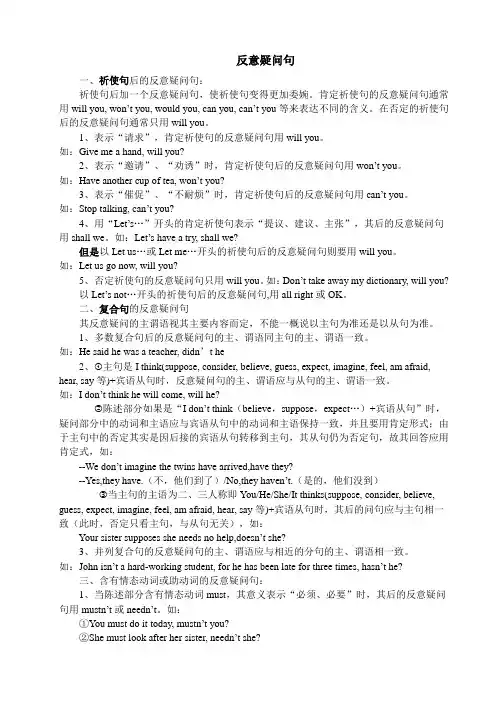
反意疑问句一、祈使句后的反意疑问句:祈使句后加一个反意疑问句,使祈使句变得更加委婉。
肯定祈使句的反意疑问句通常用will you, won’t you, would you, can you, can’t you等来表达不同的含义。
在否定的祈使句后的反意疑问句通常只用will you。
1、表示“请求”,肯定祈使句的反意疑问句用will you。
如:Give me a hand, will you?2、表示“邀请”、“劝诱”时,肯定祈使句后的反意疑问句用won’t you。
如:Have another cup of tea, won’t you?3、表示“催促”、“不耐烦”时,肯定祈使句后的反意疑问句用can’t you。
如:Stop talking, can’t you?4、用“Let’s…”开头的肯定祈使句表示“提议、建议、主张”,其后的反意疑问句用shall we。
如:Let’s have a try, shall we?但是以Let us…或Let me…开头的祈使句后的反意疑问句则要用will you。
如:Let us go now, will you?5、否定祈使句的反意疑问句只用will you。
如:Don’t take away my dictionary, will you?以Let’s not…开头的祈使句后的反意疑问句,用all right或OK。
二、复合句的反意疑问句其反意疑问的主谓语视其主要内容而定,不能一概说以主句为准还是以从句为准。
1、多数复合句后的反意疑问句的主、谓语同主句的主、谓语一致。
如:He said he was a teacher, didn’t he2、①主句是I think(suppose, consider, believe, guess, expect, imagine, feel, am afraid, hear, say等)+宾语从句时,反意疑问句的主、谓语应与从句的主、谓语一致。
五年级英语反义疑问句练习题20题(带答案)1. He is a good student, isn't he?答案:是的,他是。
因为前面是肯定句,反义疑问句部分为否定形式。
这里遵循“前肯后否”的原则,回答时如果事实是肯定的,就用Yes,he is。
2. She can sing well, can't she?答案:是的,她能。
前面是肯定句,反义疑问句部分为否定形式。
按照规则,若实际情况是肯定的,就回答Yes, she can。
3. They like playing football, don't they?答案:是的,他们喜欢。
这是肯定陈述句,反义疑问句部分为否定。
当实际情况是肯定时,回答为Yes, they do。
4. It was a beautiful day yesterday, wasn't it?答案:是的,昨天是。
前面为肯定句,反义疑问句为否定形式。
若事实是肯定的,回答是Yes, it was。
5. You have a sister, don't you?答案:是的,我有。
对于这种肯定陈述句后的反义疑问句,当实际情况为肯定时,回答为Yes, I do。
6. He doesn't like apples, does he?答案:是的,他不喜欢。
前面是否定句,反义疑问句部分为肯定形式。
如果实际情况是否定的,就回答Yes, he doesn't。
7. She isn't at home now, is she?答案:是的,她不在。
由于前面是否定句,反义疑问句为肯定形式。
当事实是否定时,回答为Yes, she isn't。
8. They didn't go to school yesterday, did they?答案:是的,他们没去。
前面是否定句,反义疑问句为肯定形式。
若实际情况是否定的,回答是Yes, they didn't。
四年级英语反义疑问句练习题30题(答案解析)1. You are a student, aren't you?A. am IB. are youC. aren't ID. am not I答案解析:本题考查反义疑问句的构成规则。
反义疑问句由两部分组成,前一部分是陈述句,后一部分是简短的疑问句,且前后两部分的人称和时态要一致。
在本题中,前一部分是“You are a student”,后一部分应该是“aren't you”。
选项A“am I”人称不一致;选项B“are you”与前一部分重复;选项C“aren't I”在口语中可以使用,但在正式场合中一般用“aren't you”;选项D“am not I”比较正式,但不常用。
所以正确答案是aren't you。
2. She likes apples, doesn't she?A. does sheB. doesn't sheC. is sheD. isn't she答案解析:本题中,前一部分是“She likes apples”,后一部分应该是“doesn't she”。
选项A“does she”与前一部分重复;选项C“is she”时态和动词不一致;选项D“isn't she”动词不一致。
所以正确答案是doesn't she。
3. He is tall, isn't he?A. is heB. isn't heC. are heD. am he答案解析:前一部分是“He is tall”,后一部分应为“isn't he”。
选项A“is he”与前一部分重复;选项C“are he”人称和动词不一致;选项D“am he”人称和动词不一致。
正确答案是isn't he。
4. They play football, don't they?A. do theyB. don't theyC. are theyD. aren't they答案解析:前一部分是“They play football”,后一部分是“don't they”。
反义疑问句练习1.Zhou Ming has few English magazines, ________?A.does heB.doesn’t heC.has heD.hasn’t he2.Cindy could hardly speak English three years ago, ________?A. couldn't she?B. could sheC. can she3.Alice had a wonderful time yesterday, _______?A. hadn’t sheB. wasn’t sheC. didn’t sheD. wouldn’t she 4.–She didn’t come to schoolyesterday, did she?–______, though she was not feeling well.A. No, she didn’tB. Yes, she didn’tC. No, she didD. Yes, she did5.---He hardly spent any time on his subjects, ________?---________, so he does badly in his lessons.A .didn’t he, Yes B. did he, Yes C. didn’t he, No D. did he, No 6.He’s read this book before, ?A. hasn’t heB. doesn’t heC. isn’t heD. wasn’t he 7.–Let’s go for a walk, ______?-- OK, I’m coming . Don’t forget to bring your camera, ______? A. will you; will you B. will you; shall weC. shall we; shall weD. shall we; will you8.John had a short walk after lunch, ________?A. did heB. didn't heC. had heD. hadn't he9.Nancy hardly rings you up, ___________?A. doesn’t sheB. does sheC. doesn’t NancyD. does Nancy 10.---Your brother often disagrees with you, _______ he ?--- _______. We often have different opinions.A.does; YesB. doesn’t ;YesC. does; NoD. doesn’t; No 11.Kate’s never late for school,?A.isn’t sheB.hasn’theC.is sheD.has she12.--- Liu Tao has never read the book The Adventure of Tom Sawyer , _______ he?--- _____. He told me it's very interesting. He'd like to read it again.A. is; No, he isn'tB. has; Yes, he hasC. isn’t; Yes, he isD. hasn’t; No, he hasn't13.—He’s never late for school, ________?—No, he isn’t .He is always very early.A. is heB. isn’t heC. hasn’t heD. has he 14.—There’s little meat left in the fridge, ________?—________. I’ll get some on my way home.A. is there, YesB. isn’t there, YesC. is there, NoD. isn’t there, No15.—Tom finished his homework, didn’t he?—__________, though he was ill yesterday.A. No, he didn’tB. Yes, he didC. Yes, he doesD. No, he doesn’t16.There is little water in the cup, ?A. is thereB. isn’t thereC. isn’t itD. is it17. He’s still not understood by his close friend although he has said sorryto him, _________?A. hasn’t heB. has heC. isn’t heD. is he18.You have never visited the place before, you?A. didB. didn’tC. haveD. haven’t19.Don't keep poison in the kitchen, _______?A. do youB. shall weC. will youD. don't you20.There are no museums in our city, _________?A. aren’t thereB. are thereC. is thereD. isn’t there21.Your father is playing the piano very well, he?A.isB.isn’tC.doesD.doesn’t22.—It’s her birthday tomorrow, ______ ?—Yes, let’s have a surprise party for her.A. isn’t itB. isn’t sheC. doesn’t itD. doesn’t she23.--- He’s never stolen anything before, _______ he?--- ________. It’s h is third time to be taken to the police station.A. hasn’t; YesB. has; NoC. has; YesD. is; No24.—It’s her birthday tomorrow, ______ ?—Yes, let’s have a surprise party for her.A. isn’t itB. isn’t sheC. doesn’t itD. doesn’t she25.-----Your father never watched the drama series on TV, __________? -----_____________________. He thinks theses drama series are boring and dull.A.does he; Yes, he does.B. does he; No, he doesn’tC. doesn’t he ; Yes, he does.D. doesn’t he ; No, he doesn’t .26.—Tom is an honest boy, _______ he?—Yes. We trust him all the time.A. isn’tB. isC. doesD. doesn’t27.Good, you’ve done it well! You need no more help from us, ______.?A. do youB. need youC. don’t youD. needn’t you28.His father had an important meeting just now, _______?A. did heB. had heC. didn't heD. hadn't he29.-- You used to be short, didn’t you?-- _______. I was the shortest in my class.A. Yes, I did.B. No, I didn’t.C. Yes, I was.D. No, I wasn’t.参考答案1.A【解析】试题分析:句意为:周明几乎没有英语杂志对吗?这是一个反义疑问句,反义疑问句的结构遵循前肯定后否定或者前否定后肯定,前后人称、时态一致的原则。
初三反义疑问句1.It’s very hot today,_________________________?2.He can speak Chinese,_________________________?3.Mary studies in a junior high school,_________________________?4.He never gets up late,_________________________?5.Don’t go out at night,_________________________?6.He seldom loves cold weather,_________________________?7.You finished the task yesterday,_________________________?8.Tom has been to Singapore,_________________________?9.The story is a little interesting,_________________________?10.E verything starts to grow in spring,_________________________?11.H e can hardly finish his homework,_________________________?12.I’m in Class 3,Grade 2,_________________________?13.L et’s go shopping,_________________________?14.S he doesn’t like climbing hills,_________________________?15.N obody knows where she lives,_________________________?16.F ew students can answer the question,_________________________?17.T hat was a wonderful night,_________________________?18.Y our sister helped me,_________________________?19.Y ou aren’t a teacher,_________________________?20.T hey haven’t been to the Great Wall,_________________________?21.Y ou will join the soccer team,_________________________?22.H e likes neither apples nor pears,_________________________?23.T here are some good books for you,_________________________?24.L et’s do it now,_________________________?25.Y ou dislike this kind of gifts,_________________________?26.N othing is impossible,_________________________?27.E verything is possible,_________________________?28.H e doesn’t go to school by bus,_________________________?29.T here is little milk lsft in the bottle,_________________________?30.L et us clean the classroom by ourselves,_________________________?31.H e has studied here for about four years,_________________________?32.Y ou never lost money before,_________________________?33.F ew of them hurt themselves in the accident last night,_________________________?34.P eter could hardly see the words on the blackboard,_________________________?35.T here will be a volleyball match in our school,_________________________?36.D on’t smoke in the reading room,_________________________?37.I don’t think he is right,_________________________?38.Y ou must do your homework by yourself,_________________________?39.Y ou mustn’t touch the machine,_________________________?40.S omeone looked for you yesterday,_________________________?1.isn’t it2.can’t he3.doesn’t she4.does he5.will you6.does he7.didn’t you8.hasn’t he9.isn’t it 10.doesn’t it 11.c an he 12.aren’t I 13.shall we 14.does she 15.do they/does he16.c an they 17.wasn’t it 18.didn’t she 19.are you 20.have they21.w on’t you 22.does he 23.aren’t there 24.shall we 25.don’t you 26.i s it 27.isn’t it 28.does he 29.is there 30.will you 31.hasn’t he 32.d id you 33.did they 34. could he 35.won’t there 36.will you37.is he 38.mustn’t you 39.must you 40.didn’t they/didn’t he。
完整版)反义疑问句经典练习(含答案)1.XXX't eat anything this morning。
did she?2.There'XXX。
is there?3.He has never ridden a horse before。
has he?4.He seldom came here。
did he?5.Everything seems all right。
doesn't it?7.One can't be too modest。
can one?8.No one failed in the exam。
did they?11.He can't be her father。
can he?12.They have no time to visit the museum。
do they?18.He dislikes the two subjects。
doesn't he?19.These tools are useless now。
XXX?23.Let's go there by bus。
shall we?A。
XXX24.Shall we go play football?25.Won't you give Polly some food and change her water?26.Shall we go shopping this afternoon?27.Would you pass me the nary。
please?30.Is there little water in the glass?32.XXX Saturday evening?33.Did XXX?34.Don't you believe you are right?35.Doesn't she think that Tom sings best in the class? XXX't want to hurt me。
四年级英语反义疑问句练习题30题含答案解析1.She is a student, isn't she?Yes, she is. 本题考查be 动词的反义疑问句。
前半句是肯定句,be 动词是is,所以后半句用isn't she。
2.They are in the classroom, aren't they?Yes, they are. 前半句是肯定句,be 动词是are,反义疑问句用aren't they。
3.He is a teacher, isn't he?Yes, he is. 肯定句中be 动词是is,反义疑问句用isn't he。
4.We are friends, aren't we?Yes, we are. 肯定句be 动词是are,反义疑问句用aren't we。
5.The book is on the desk, isn't it?Yes, it is. 肯定句be 动词是is,反义疑问句用isn't it。
6.She is happy, isn't she?Yes, she is. 肯定句be 动词是is,反义疑问句用isn't she。
7.They are playing games, aren't they?Yes, they are. 肯定句be 动词是are,反义疑问句用aren't they。
8.He is reading a book, isn't he?Yes, he is. 肯定句be 动词是is,反义疑问句用isn't he。
9.We are having lunch, aren't we?Yes, we are. 肯定句be 动词是are,反义疑问句用aren't we。
10.The girl is singing, isn't she?Yes, she is. 肯定句be 动词是is,反义疑问句用isn't she。
反意疑问句一、祈使句后的反意疑问句:祈使句后加一个反意疑问句,使祈使句变得更加委婉。
肯定祈使句的反意疑问句通常用will you, won’t you, would you, can you, can’t you等来表达不同的含义。
在否定的祈使句后的反意疑问句通常只用will you。
1、表示“请求”,肯定祈使句的反意疑问句用will you。
如:Give me a hand, will you?2、表示“邀请”、“劝诱”时,肯定祈使句后的反意疑问句用won’t you。
如:Have another cup of tea, won’t you?3、表示“催促”、“不耐烦”时,肯定祈使句后的反意疑问句用can’t you。
如:Stop talking, can’t you?4、用“Let’s…”开头的肯定祈使句表示“提议、建议、主张”,其后的反意疑问句用shall we。
如:Let’s have a try, shall we?但是以Let us…或Let me…开头的祈使句后的反意疑问句则要用will you。
如:Let us go now, will you?5、否定祈使句的反意疑问句只用will you。
如:Don’t take away my dictionary, will you?以Let’s not…开头的祈使句后的反意疑问句,用all right或OK。
二、复合句的反意疑问句其反意疑问的主谓语视其主要内容而定,不能一概说以主句为准还是以从句为准。
1、多数复合句后的反意疑问句的主、谓语同主句的主、谓语一致。
如:He said he was a teacher, didn’t he2、①主句是I think(suppose, consider, believe, guess, expect, imagine, feel, am afraid, hear, say等)+宾语从句时,反意疑问句的主、谓语应与从句的主、谓语一致。
如:I don’t think he will come, will he?②陈述部分如果是“I don’t think(believe,suppose,expect…)+宾语从句”时,疑问部分中的动词和主语应与宾语从句中的动词和主语保持一致,并且要用肯定形式;由于主句中的否定其实是因后接的宾语从句转移到主句,其从句仍为否定句,故其回答应用肯定式,如:--We don’t imagine the twins have arrived,have they?--Yes,they have.(不,他们到了)/No,they haven’t.(是的,他们没到)③当主句的主语为二、三人称即You/He/She/It thinks(suppose, consider, believe, guess, expect, imagine, feel, am afraid, hear, say等)+宾语从句时,其后的问句应与主句相一致(此时,否定只看主句,与从句无关),如:Your sister supposes she needs no help,doesn’t she?3、并列复合句的反意疑问句的主、谓语应与相近的分句的主、谓语相一致。
如:John isn’t a hard-working student, for he has been late for three times, hasn’t he?三、含有情态动词或助动词的反意疑问句:1、当陈述部分含有情态动词must,其意义表示“必须、必要”时,其后的反意疑问句用mustn’t或needn’t。
如:①You must do it today, mustn’t you?②She must look after her sister, needn’t she?如果must的含义表示“一定是、想必”等推测意义时,其后的反意疑问句则要依据句中的谓语动词的时态结构采用be/have/did/do+not等相应形式。
如:①He must bee ill, isn’t he?②You must have seen the film before, haven’t you?2、如果陈述部分用了must have+P.P.(过去分词),但明示或暗示了过去的时间,其反意疑问句用过去时。
如:He must have seen him yesterday, didn’t he?3、陈述部分含情态动词ought to,其后反意疑问句用oughtn’t或shouldn’t.如:I ought to come here, oughtn’t I?4、陈述部分含情态动词used to其后反意疑问句用usedn’t或didn’t均可。
如:Tom used to live here, usedn’t he?5、陈述部分含有have/has/had to时,其后的反意疑问句用do的相应形式。
如:You have to go, don’t you?但是在陈述句中用have/has/had got to来代替have/has/had to时,反意疑问句用have 的相应形式。
如:Ann has got to see a doctor, hasn’t she?6、陈述部分有had better/would rather时,其后的反意疑问句用hadn’t/wouldn’t。
如:①You’d better not stay here, had you?②They would rather take this one, wouldn’t they?7、当陈述部分有dare或need时,若dare和need为实义动词疑问部分的谓语用do的适当形式;若dare和need为情态动词,疑问部分用dare和need构成。
Need与Dare 用法区别一、need的用法1)need可用作实义动词,意为"需要;必要",后面可接名词、动名词或动词不定式等作宾语。
注意"need doing"表示被动意义,相当于need to be done。
例如:I need a dictionary, so I need to go to the bookstore. 我需要一本词典,因此我要去趟书店。
How often does your hair need washing(need to be washed)? 你的头发需要多久洗一次?2)need可用作情态动词,通常用于疑问句和否定句中,后接动词原形。
这时need没有人称和数的变化,也没有时态的变化。
例如:It's only eight o'clock. Need you go so early? 才八点。
你需要去这么早吗?You needn't tell him about it as I have told him. 你不必跟他说那件事,我已经告诉他了。
3)needn't do与needn't have done的区别:两者都表示"不必做......"。
但前者表示现在或将来不必做;而后者表示"过去(本来)不必做(而事实上已经做了)"。
例如:You needn't carry the desks out of the classroom when you clean the classroom. 你打扫教室时不必把桌子搬到教室外。
You needn't have bought such a big TV as it takes too much room. 你本来不必买这么大的电视,它占据的空间太大了(而事实上已经买了)。
二、dare的用法1)dare用作实义动词,此时其后的动词不定式可带to也可不带to,且dare有人称和数以及时态的变化。
例如:I dare to jump down from the top of the wall. 我敢从那墙头上跳下来。
She doesn't dare (to) meet her teacher's eyes. 她不敢与老师对视。
2)dare用作情态动词,后跟动词原形,主要用于疑问句、否定句和条件句中。
例如:How dare she do things like that to me? 她怎么敢对我做那种事?-Dare you catch the mouse? 你敢去抓那只老鼠吗?-I daren't do that. 我不敢抓。
If you dare say that to our teacher, I would vote for you. 如果你敢向我们的老师说那件事,我就投你一票。
四、陈述句主语是某些不定代词的反意疑问句:1、陈述句部分主语是everything, something, anything, nothing时,其后的反意疑问句主语用it。
如:①Everything seems all right, doesn’t it?②Nothing is in the box, is it?2、陈述部分的主语是everybody, somebody, anybody, nobody, everyone, no one, none, either, some one时,其后的反意疑问句用主语they以兼顾所指代的男、女两性。
如:Everybody has got the new books, haven’t they?3、陈述部分主语是不定代词one时,其后的反意疑问句一般用主语one。
如:One can’t be always careful, can one?五、含有否定词或半否定词的反意疑问句:1、陈述部分含有no, never, seldom, hardly, rarely, scarely, few, little等否定或半否定意义的词时,都视为否定,故反意疑问句部分用肯定形式。
如:Few people knew the answer, did they?2、如果陈述部分的否定意义只是由单词加否定前缀构成时,其后的反意疑问句一般要用否定形式。
如:He is unhappy, isn’t he?六、陈述部分的主语是指示代词的反意疑问句:1、陈述部分主语是指示代词this, that时,其后的反意疑问句用主语it。
如:This is important, isn’t it?2、陈述部分主语是指示代词these, those时,其后的反意疑问句用主语they。
如:Those are mine, aren’t they?七、反意疑问句的其他特殊形式:1、陈述部分是“I’m…”结构时,其后的反意疑问句用aren’t I?如:I am a student, aren’t I ?2、陈述部分是there be或there live, there stand, there used to be等结构时,其后的反意疑问句用主语there。